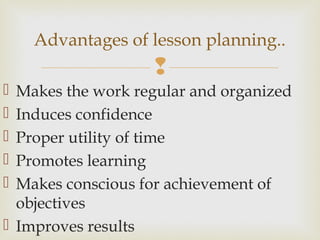Lesson planning.
- 2. By : Hamad ali Lesson planning
- 3. Contents
- 4. Standard stages of lesson. Instructional activity. Introduction. Statement of aim. Development. Recapitulation. Consolidation. Conclusion.
- 5. (a) what is a lesson: Lesson is well planned and structured assignment to be learned by pupil. It is a well defined basic unit of instruction completed in a time period. Lesson is a mixture of number of ingredients, techniques, activities and contents. Lesson is the specific topic which the teacher has to teach during the limited time period in front of students of a specific class. Introduction..
- 6. Cognitive lesson: The activities are related with acquisition of knowledge. The aim of this method is to achieve more knowledge. Affective Lesson: Affective activities are related with feelings and emotions. This method affects the feeling directly. Like a class of drawing or music. Different types of lesson.
- 7. Physcho Motor Lesson: The activities are related to manipulation of skills. It gives them a sense of satisfaction and pleasure. .
- 8. The organization of pupil learning activities and resources that are needed for a specific period of time in such a way the maximum learning will result from the experiences The teacher’s social, mental and emotional visualization of classroom experiences. The pool of ideas about what is to be done and how is to be done? What is a lesson plan?
- 9. Lesson plan is a guide which gives security to a teacher and direction to the students A lesson plan is an extremely useful tool that serves as a combination guide, resource, and history document reflecting our teaching philosophy and most importantly our goals for our students. Provides opportunities to a teacher to experiment his own ideas. Contd…..
- 10. The teacher must have command on the subject required to teach. Have knowledge about the age and mental level of the students. Objectives of teaching must be very clear Awareness of various techniques of teaching Possess the organizational competence to make the best use of available resources. Teacher’s knowledge and skill in evaluation and test construction is also important. Essentials of Lesson planning
- 11. Well thought out scheme according to which an activity is brought to completion. An organized sequential mental rehearsal of all the phases of the activity. Advanced arrangement for doing something in a proper way. Why Lesson Plan is important?
- 12. Inculcates self confidence in a teacher. Integrates different lesson so provides consistency and continuity in teaching process. Provides satisfaction to students and teachers Provides the chance of self improvement to the teacher Contd…..
- 13. Keeps the teacher and students on the track Achieves the objectives Helps the teacher to avoid unpleasant surprises. Provides the roadmaps and visuals in a logical sequence Provides direction to a substitute. Good Planning….
- 14. Based upon the previous knowledge. Uses motivational techniques Includes necessary materials Is student centered, flexible, complete, interesting and activity based. Has proportionate time allocation Contd…..
- 15. Includes evaluation process Provides information for the use of A.V aids. Provides assignment for the students. A lesson plane should be in written form. Contd…..
- 16. Frustration for the teachers and students. Aimless wandering. Unmet objectives No connection to the prior learning. Dis organization . Poor planning..
- 17. Lack of needed materials. Poor management. Teacher’s instruction are inefficient . Contd…..
- 18. Structure the lesson Organize its contents. Determine the method of delivery. Assess students learning. Evaluate its applications Purposes of lesson plane…
- 19. Daily planning Weekly planning Unit planning Term planning Yearly planning Level of lesson planning.
- 20. Makes the work regular and organized Induces confidence Proper utility of time Promotes learning Makes conscious for achievement of objectives Improves results Advantages of lesson planning..
- 21. Good questions are essential for effective communication between the teacher and students. Mis use of this skill creates dis interest and boredom in the students. Ask question from the entire class to promote thinking in all students. Questioning techniques
- 22. ASK – PAUSE – Call technique can be used Distribute the questions at random . do not ask question from selected students. Ask thoughtful questions like Why , What , When How etc. Acknowledge all answers to ensure incorrect or vague answers are clarified. Contd…..
- 23. Direct questions are effective when you suspect an individual’s attention is wandering. Do not waste time in pumping a student, if the student does not know the answer , offer explanation or ask question from another student Do not use tricky question Do not compromise on the collective answer. Contd…..
- 24. Introduction Statement of aim Development Recapitulation Consolidation Conclusion Standard stages of a lesson
- 25. Purpose: Gives appropriate beginning To focus the attention of the students Creates interest Provides a motive to learn Linkage with learners background knowledge Introduction:
- 26. Features: Short Relevant Interesting Innovative Imaginative Revealing the aim at the end
- 27. Statement of aim : Clear Focused upon throughout the lesson Specifies the scope of lesson. Should not be very less/more
- 28. Main part of the lesson Set up a step by step plan Logical order explanation : From known to unknown From easy to difficult From simple to complex Maximum use of AV Aids Development
- 29. Conduct planned activity Much class participation Apply maximum questioning Maintain writing board summary gradually. Contd…..
- 30. Purpose Final summing up of the lesson Important points are revised To ascertain effective learning To remove mis conception No new points are introduced Redisplay of teaching aids Ask revisionary questions Recapitulation
- 31. Invite or ask question Evaluation of learning Teachers performance Give homework to check the application of lesson. Consolidation
- 32. Review the key points of the lesson Give students opportunities to draw conclusion from the lesson. It should be meaning full end of the lesson Preview future lesson To give sense of completion Conclusion
- 33. He who fails to plan, plans to fails..
- 34.


































